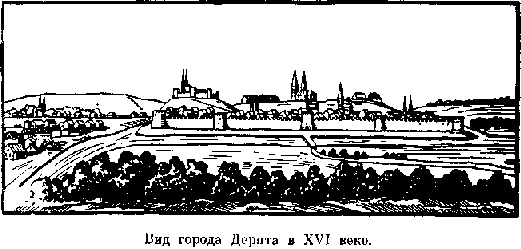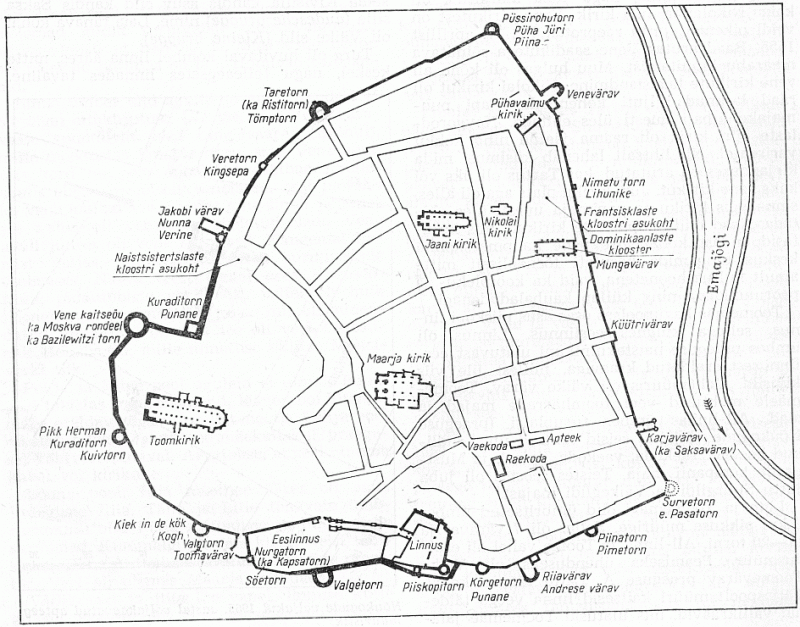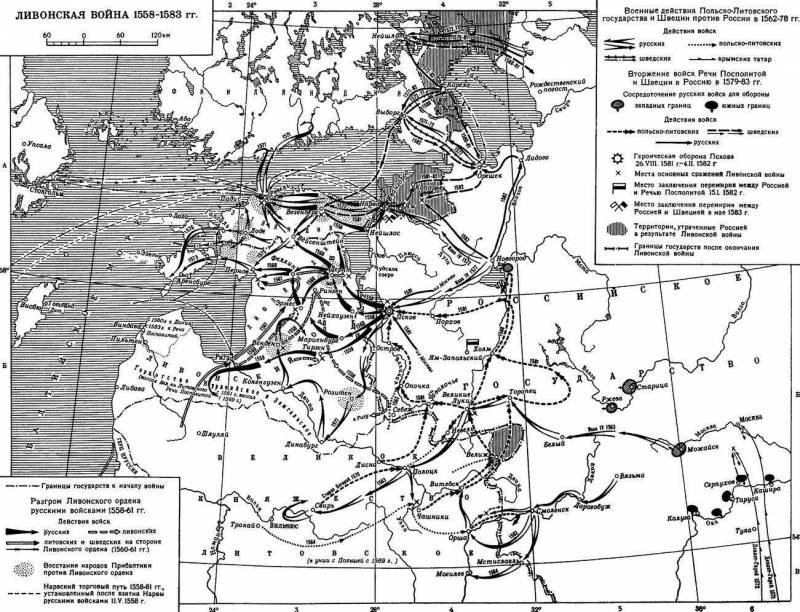Siege of Dorpat

The fall of Yuriev was for the Livonian Confederation an even stronger blow than the capitulation of Narva. East Livonia, in fact, was at the mercy of the Russian tsar.
Fall of Dorpat
8 July 1558, the Russian army came to Dorpat - Yuryev. Having approached the city, the Russians immediately began siege works, which developed according to a well-established order. According to the chronicler: “how the governors came to Yuryev and took out the outfit from the ships and the archers from the city before the tours dug in and the German cities zbili”. An important role in the capture of the city was again played by the archers of Teterin and Kashkarov, and the gunners. It was on their shoulders (and there were quite a few of them, about 500 archers) that bore the brunt of siege works and daily combat work in trenches. Attempts of the Dorpat garrison to make forays had no success. Strelets, Pskov militia and servants of the boyar children stubbornly, despite the resistance of the enemy, dug trenches, built chances and batteries for artillery delivered by water from Narva.
For the old fortifications of Dorpat, the actions of the Russian artillery turned out to be decisive, as in the sieges of Narva, Neishloss and Neuhausen. July 11 Russian gunners opened heavy fire, "shooting, ovo fiery Kuli, ovo stone." Soon the position of Dorpat became hopeless. “And from the side they beat six den,” the Russian chronicler noted, “and the city wall was broken and many people were beaten in the side of the city”. The advantage of Russian artillery and rati was obviously brewing assault. There was no unity among the townspeople, the ranks of the defenders thinned out from Russian fire, and desertion. There was no hope of assistance from the master of Furstenberg. The master himself responded to calls for help that he “sincerely regrets the sad state of the city and appreciates the firmness of the bishop and the respectable community; he did not quite approve of the actions of the nobles and the Landsass who had left their masters, which, of course, would later serve them to shame. He (the master) wants others to have the courage that a person is capable of to protect a glorious city. But, despite all his regret, he sees that he will not be able to resist such a huge, as he learned from all intelligence, army, which is now the enemy, but, however, he will earnestly pray to the merciful God for day and night to think about how to recruit more people for the troops. ”
Thus, in the face of the inevitable destruction of the fortifications and the last assault, the outcome of which was obvious, Bishop Herman decided to follow the example of Narva. As the Pskov chronicler wrote: “The Biscopes and the Germans Posadniki commanders Prince Petrow Ivanovich and the comrades Yuryev city were peacefully advised, on 20 day in July, they should live with the Tsaris and the Grand Duke to judge them their houses also shall not be made of hail. "
In the surrendered city, the Russians captured huge booty. Thus, according to the Lebedev Chronicle, "the guns took the largest and the least fifty fifty-two guns." Livonian chronicler Renner calls an even greater number - 700. Obviously, a significant number of these guns - serfs. Also a large number of various property was seized. The Livonian chronicler Russov (Ryussov), it is clear that exaggerating, wrote that "it is impossible to describe how much treasure Muscovites took in this city with money, silver and gold, and all sorts of jewels and ornaments from the bishop, canons, nobles and burghers." Interestingly, in one of the city’s caches, the Russians found 80 thousand thalers. Russov noted with bitterness that the Dorptans, because of their greed, lost more than the Russian Tsar demanded of them. The funds found would be enough not only for the Yuriev tribute, but also for hiring troops to defend the Livonian Confederation.
Fortifications of Dorpat to the 17 century
The rout of Livonia
The fall of Yuriev was for the Livonian Confederation an even stronger blow than the capitulation of Narva. East Livonia, in fact, was at the mercy of the Russian tsar. Livonian castles and towns, after the capture of St. George, surrendered without much resistance. A participant in the Russian campaign, Prince A. M. Kurbsky, wrote later that the royal governors "of that summer took German cities from a place of twenty-five; and the rest of the land in Toi, right up to the very primozimi, and return to our king with a great and light victory, more and we will take the city, where the German army resisted us, everywhere I will defeat them from us sent to the captains ... ”.
Livonia was falling apart. The news of the fall of a rich city, the actual capital of Eastern Livonia, well fortified and well supplied with artillery, led to a panic of vassals of the Dorpat bishop. Order and episcopal officials, knights in a panic fled, forgetting about their responsibilities for the organization of defense. Local residents “beat their brows” to the royal governors so that they would not “fight” them. Entire towns and villages took the oath to the Russian Tsar. If Ivan the Terrible really wanted to conquer Livonia, he would not have had a better time than summer - autumn 1558 of the year. The dilapidated building of the Order, corroded by various contradictions and accumulated problems, collapsed right before our eyes. The Order accused the Livonian nobles of indifference to the fate of Livonia, unwillingness to fight. The nobles blamed the order of the authorities that they did not allocate funds for the purchase of a sufficient number of hired soldiers. The burghers thought only of their privileges and how to preserve property. Extreme were, as is usually the case, simple peasants abandoned to the mercy of fate (war). Furstenberg, who failed to organize a repulse against the Russian invasion, was rapidly losing the remnants of authority and authority. The pro-Polish party, which was able to achieve the election of a coadjutor (deputy) to Fellin commander G. Kettler, a supporter of orientation to Poland, sharply increased.
But while the Livonians tried and ordered what to do next, the pogrom and collapse continued. Small Russian-Tatar detachments "fought" in Eastern and Northern Livonia, wreaked havoc and destruction, reached the outskirts of Reval. But their actions had no serious military consequences. It is possible that if the army of Shuisky with a powerful outfit came under Revel, then this city could have capitulated. But this did not happen. The summer campaign was coming to an end. The Russian army was tired and needed rest, “stock up for feed and horses to feed”, preparing for a new campaign. Huge booty - "stomachs", now fettered Russian troops. It was necessary to take out the good, to settle prisoners on the estates. In addition, the troops thinned, not so much from the casualties of battle (there were no major battles), but rather from the boyar children and their children who had driven home for various reasons. As a result, the Russian troops left their winter quarters within their borders, leaving small garrisons in the cities and castles, which covered the withdrawal of the main forces and controlled the occupied area.
Meanwhile, the circle of participants in the war began to expand. Denmark intervened in the conflict. Danish king Christian III decided it was time to take part in the section of the Livonian inheritance. Denmark declared its claims to North-West Livonia with Revel and the possessions of the Bishop of Esel. In August 1558, the Danish ambassadors arrived at Dorpat.
Livonian counter attack
While the Russians were celebrating the victory and leaving for the winter apartments, the Livonians hatched plans for revenge. The master of the Order of Furstenberg, his deputy Kettler, the Riga Archbishop Wilhelm and the commander of the troops of the Riga Archdiocese von Felkersz began the preparation for the offensive in the summer of 1558. The first hundreds of German mercenaries arrived in Riga. Several thousand soldiers were hired by the Master through the mediation of Henry II, Duke of Brunswick-Lüneburg. Gunpowder and lead were transported from the Hanseatic cities in Livonia. Close to the front line, they brought ammunition, provisions, fodder and other supplies.
The preparation of the enemy for the counteroffensive for the Russians remained unknown, as well as the beginning of the autumn offensive of the Livonian army — unnoticed. Small Russian detachments continued their raids, seized the small castles of the settlement, and swore allegiance to the sovereign of the local "black people." In August, on the Voivod's "replies", the Wessenberg (Rakovor), Borholm (Porhol), Lais (Laus), Tolsburg (Tolschbor), Poddes (Potushin) and Adsell were taken from the Voevodsky, in the end of September - Kaveleht (Kinevel) and Oberpalen (Polchev). And the Russian flying squads continued to ravage the outskirts of Revel. It seemed that the enemy was defeated and threatened nothing by the Russians. Therefore, the king ordered the governor Shuisky to go to the capital. Ivan the Terrible rewarded his warriors. The sovereign "granted them love and greetings ... and praising their righteous direct service and promising them a great salary ...". In Aleksandrovskaya Sloboda, the tsar "boyars and all the governor favored with fur coats and goblets and argamaks and gave horses and armor to them and gave them enough land and feeding them". Nor were the children of the boyars, whom Ivan Vasilievich "favored many with his salary, with fur coats and buckets and with kams and dengs and horses and with armor and feeding and estates." That is, the Russians celebrated the victory.
In the autumn of 1558, under the leadership of Kettler, a rather serious army was assembled: Livonian sources report 2 thousand cavalry, 7 thousand knights (hired infantry) and 10 thousand militias (according to other sources - 4 thousand cavalry, around 4 - 7 thousand. infantry). The Pskov Chronicle noted that, according to the “tongues” taken in battle, more than 10 thousand soldiers march with the master. These were considerable forces by European standards. The Order spent a lot of money on Reiters and bollards. Obviously, such a serious army for Livonia had to solve an important task - to repel Dorpat-Yuryev. The Livonian army had the strength to take the barriers and take Yuriev with a quick blow (using its supporters in the city). However, on the way of the Germans, there was a small Ringen castle (Rydekh, Ryngol) with a small but brave Russian garrison under the command of Governor Rusin-Ignatiev. Here she found a scythe on a stone. The heroic defense of Ringen frustrated the enemy counterattack.
- Alexander Samsonov
- Livonian war
460 years ago the Livonian War began
Russian victories in the Livonian War
Winter Pogrom of Livonia
Storm of Narva


Information